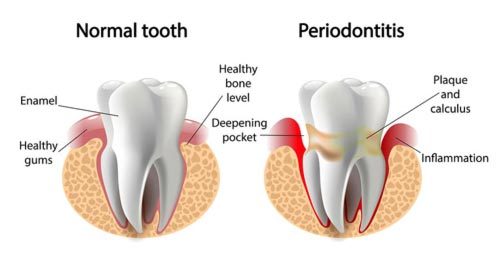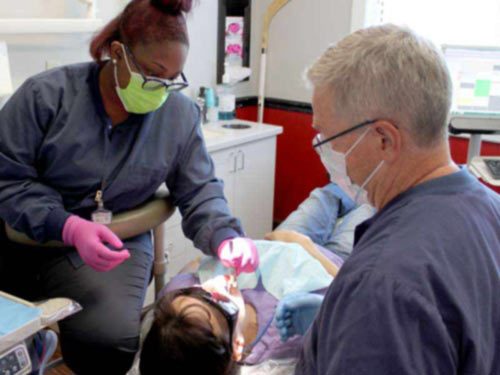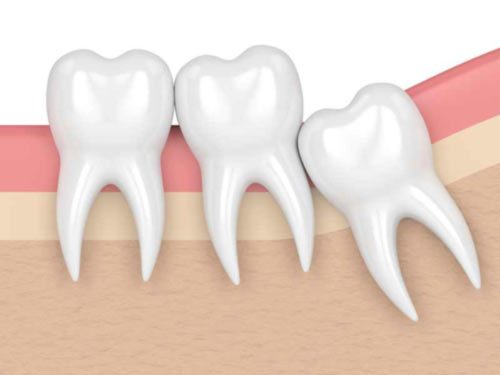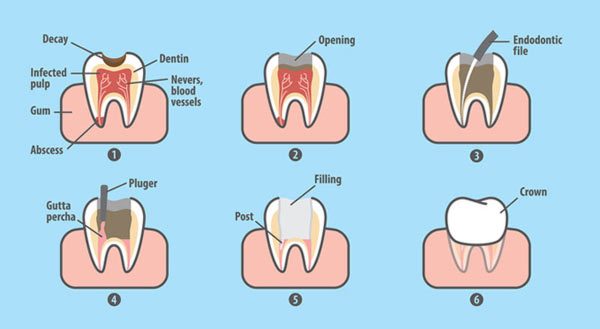Comprehensive Family Dentistry in Apex, NC
Prevention Services
We provide comprehensive family dentist/general dentistry and endodontics services to your entire family dentist in Apex, NC. As a graduate of a one-year and a two-year General Dentistry residency, Dr. John Kitzmiller is able to offer to you, many services without having to refer you to another office. However, if the procedure requires a specialist, he has teamed up with some of the best specialists in the Apex, Cary, Raleigh area. Our dental team will discuss problem areas, discuss options, and create a comprehensive treatment plan personally tailored for your best oral health care.
Cleaning & Check-up Appointments
Page Topics
- Cleaning / Hygiene
- Fluoride Supplements
- Sealants
- Home Care Instructions
- Digial Xray Diagnostics
- Comprehensive Examination
- Halitosis (Bed Breath) Evaluation
- Oral Cancer Screening
- Peridontal Exam
We conduct a full examination of your gums and the structures that support your teeth.
- Check probing depths (space from top of gum to bottom of gum).
- Evaluate bleeding of your gums during your exam as bleeding is a sign or periodontal disease.
- Check the condition / amount of the bone around your teeth.
- We will help you identify your risk factors:
- Smoking or dipping tobacco.
- Diabetes.
- Amount of plaque on your teeth.
- Skills in taking care of your mouth.
- Diet.
- Your genetics.
- Show you what steps you can take in the prevention of gum disease.
We may also make a referral to a family physician to control systemic disease.
What Really Causes Tooth Decay?
Diagnostic Evaluation Tools
All x-rays are prescribed for you according to your condition! We follow the American Dental Association guidelines for prescribing dental x-rays.
![]() See the tools and learn more on the Office & Technology page & Patient Education Center.
See the tools and learn more on the Office & Technology page & Patient Education Center.
This x-ray is a dental ‘CT’ scan that has about the same radiation exposure a full mouth series.
- It gives a 3D representation of your bone and associated structures.
- They help in more accurate placement of dental implants.
- It aids us in the identification of critical structures in a 3D relationship.
- A Panorex x-ray identifies pathology (abnormal conditions) on a larger scale.
- The machine rotates around your head to scan.
- Helps examine growth and development.
- Assists in extraction of wisdom teeth.
- Identifies critical structures in surgical evaluation such as crowns and implants.
- Digital Panorex which we use emits lower radiation over older Panorex techniques.
- Helps evaluate cavities between the teeth, especially the hard to see molars in the back of your mouth.
- Bitewaings are good evaluation of bone loss when combined with periapical x-rays.
- Periapical x-rays let us see the entire tooth, root and crown.
- They isolate individual teeth in a smaller area.
- They help evaluate bone and the tip of the root for infection.
What is a Full Mouth Series?
It is a collection of periapical and bitewing x-rays of all your teeth. It is used in evaluation of periodontal disease and complex dental disease.
DIAGNOdent laser readings of your teeth.
DIAGNOdent® is a small laser instrument called used to scan your teeth with harmless laser light to search for hidden decay. Learn more in the brochure below.
More text here from the digital practice page old site add photo from photos folder (just the machine)
Intraoral photography is taken digitally with cameras on a pen-shaped wand.
- Takes a closer look at small, hard to see areas in the back of the mouth.
- Enables us to show you what we see on the chair-side monitor.
- Enables our dental team to look closely at an area that is hard to see the correct angle with the naked eye.
- Important for your dental records.
- Easy to review and compare with other dental diagnostic tools.
Dental Treatments
Dry Mouth
Dry mouth (xerostomia) is a condition of having low saliva production. Dry mouth can contribute to tooth decay, causing it to progress very quickly. Untreated, dry mouth can also contribute to bad breath.
Sealants
Dental Sealants are applied to protect teeth from decay. A dental sealant is a material applied to the chewing surfaces of the molars.
The sealant material flows into the pits and grooves on those surfaces and acts like a barrier from bacteria decaying the tooth’s outer surface, the enamel.
Fluoride
Fluoride is a mineral that helps make teeth stronger and protects them from decay. Fluoride is also in anti-cavity toothpastes and mouth wash and supplements may be recommended if you are on well water.
Fluoride is used to reduce the pain caused by exposed root surfaces with receding gums. Regular fluoride application helps eliminate root sensitivity.
Fillings
TMJ
Temporomandibular Joint Dysfunction (TMJ)
TMJ Dysfunction involves your jaw joint along with the muscles used in chewing. Most patients can be treated quickly and effectively with simple therapy.
- TMJ also goes hand in hand with Bruxism.
- Untreated, it can lead to pain, joint damage and tooth loss.
- Early treatment will save you money.
Bruxism
Bruxism is often referred to as clenching or grinding.
Bruxism and TMJ may be the cause of headaches or jaw pain from clenching or grinding at night. Consequences of not treating your TMJ and Bruxism (often related) can lead to:
- joint damage,
- muscular pain,
- notching of teeth,
- cracking of teeth,
- severely worn teeth.
- and tooth loss.
Grinding
Mouth Guards
- Night guards to prevent trauma from tooth grinding or clinching.
Sports Guards
- Custom mouth guards for sports as protection for dental injury.
- Make your sport guard part of your uniform.
Sleep Apnea
Gum Disease Therapy
Periodontal Treatment
Periodontal Disease frequently can be treated effectively if identified early before severe bone loss occurs. It is a complex disease which has been closely linked to heart disease, low birth weight babies, smoking and to other human conditions.
![]() See our Patient Education Center for videos and more on this topic.
See our Patient Education Center for videos and more on this topic.
How Periodontal Disease Develops
Bacteria in your mouth create plaque build up causing gum inflammation, bleeding, gum and/or bone loss. Risk factors that promote bacterial growth include smoking, poor brushing, and inadequate flossing habits. A complex reaction with your immune system may increase your inflammation.
We strive to prevent gum disease, but can treat it in the early stages.


Our Goals
- Early detection & treatment.
- Customize your treatment plan according to your condition.
- Improve your home care.
- Establish a 3 or 4 month periodontal maintenance program according to your condition.
- Referral to a Periodontist, if needed.
Consequences of Untreated Periodontal Disease
Bacteria and plaque along with a complex reaction with your body’s chemistry and immune system, lead to inflammation, bleeding, gum and bone loss. Your risk factors increase the severity and progression of your periodontal disease.
Overcoming Periodontal Disease
Early intervention saves your teeth, time and money. Treating gum disease is similar to building the foundation of a house. Without a good solid foundation, the rest of your treatment will fail. Let us evaluate you and see if we can help you in our office. Schedule an appointment for a comprehensive exam and periodontal treatment.
Consequences of Bone Loss
- Begin with an initial deep cleaning with anesthesia. See the Comfort Measures section of the Patient Information page.
- Removal of the infection, plaque / bacteria around your teeth.
- Periodontal therapy visits every 3 to 4 months with a hygienist.
- Evaluate your response to the deep cleaning.
- Decrease gum bleeding.
- Decreased pocketing
- Evaluate your home care.
- Many teeth have nooks and crannies where bacteria can hide.
- Bacteria accumulate in these areas.
- Bacteria become destructive to gum / bone in about 3 months.
- The hygienist removes bacteria from the places that you are unable to clean at home.
- Pockets over 4 mm.
- Concavities on root surfaces and between roots.
With 3 to 4 month cleanings, we keep bacteria from becoming destructive, this enables bone and gum preservation.
If you respond well:
- We will treat the remaining problems in our office. You will use home rinses and brushing aids.
- We may use limited Arrestin placement. This is an antibiotic treatment placed in the infected gum.
- We will recommend hygiene (cleaning) appointments every 3-4 months to continue care.
If you do not respond well:
Dr. Kitzmiller will refer you immediately to a Periodontist for further evaluation and treatments such as:
- Bone grafting
- Laser surgery (LANAP)
- Gum grafting
- Other procedures which we cannot provide comfortably here.
Detailed plans from our specialist will be prescribed for you with further evaluation of complex risk factors.
Extractions
Oral Surgery
If you think that you may need a tooth removed. Let us take a look to see if we can help. We will work with you one on one to determine what is best for you.
![]() Visit our Patient Education Center for videos and more on this topic.
Visit our Patient Education Center for videos and more on this topic.
Simple Extractions
Extractions for all teeth are done on a case by case basis. We will help get you out of pain and resolve infections which can be life threatening.
In our office we can remove primary teeth and crowded teeth in preparation for orthodontics.
We will evaluate your situation to give you options and will refer you to an Oral Surgeon if necessary.

Wisdom Tooth Removal
We offer extractions for wisdom teeth for those patients who do not require IV sedation or are very nervous.
The shape of the tooth, closeness to the nerves and blood vessels, length of the root, location of the sinus, and age of the patient are factors which contribute to whether an extraction should be referred to an oral surgeon.
Comfort Measures
We offer comfort measures for anxiety and pain control that other dentists in the Apex, Morrisville, Cary area do not offer.
Root Canals
Endodontics
Treatment of the “Root Canal” system (endodontic therapy) involves cleaning of the canal which is located in the middle of the root. Bacteria get inside, destroy the nerve and create an infection inside the tooth. Often the pain is unbearable. The infection spreads out the tip of the root and enters the bone. Sometimes the infection will drain out through the gum, but sometimes it may drain into deeper areas of the head and neck which may be life threatening.
![]() Visit our Patient Education Center for videos and more on this topic.
Visit our Patient Education Center for videos and more on this topic.
Our Goals
- Remove the infection from the root canals inside the tooth.
- Eliminate the pain associated with a dying nerve or infection.
- Promote healing for the bone around the tooth.
- Stabilize the tooth to get it ready for a crown.
How do we clean out the infection inside the canals?
The canals are accessed through the top of the tooth. Titanium files and solutions are used to loosen and remove the infection. The canal space is then filled with Gutta Percha, a soft, flowable, flexible material.
Once the canals are disinfected and filled, the bone heals and the tooth feels better.
Steps in the Root Canal
- Open the tooth through the exposed surface
- File out the decay
- Fill
- Cap with a crown

Options for Root Canals
Extraction – Many factors make Root Canal treatment less likely to succeed. These may include root fracture / splitting, and difficult canals to fill which have extreme shapes and curves. Multiple costs in addition to the Root Canal itself may make it cost prohibitive. To stop the spread of infection, the tooth can be removed and the infection cleaned out.
Extraction, Bone Graft & Implant – Dental implants may provide a very conservative replacement for your teeth. Implant success rates are beginning to surpass Root Canals.
Extraction & Bridge – A bridge is a quick and simple way to hold the space for a missing tooth. Visit the bridges page to learn more.
No treatment – While this is an option, failing to treat can lead to more pain, severe infection and potential life threatening outcomes. It is generally not recommended.
- A root canal preserves the tooth for chewing, speaking and smiling.
- It holds the space so other teeth can’t drift and move.
- It is a conservative treatment with the goal of preserving your natural tooth.
- A root canal has a success rate of 85 to 90% depending on your situation.
- In order to remove the infection from the tooth, an opening is made in the top of the tooth and weakens it.
- To strengthen the tooth, 2 additional procedures will need to be completed: a core build up (fills the root canal opening) and crown (“cap” to hold the tooth together). Inquire about the total cost before you proceed. Apex Dental Group uses CEREC dentistry which differs from other dentists in the Apex, Cary, Raleigh, NC area.
- If the cavity was into the nerve and down to the bone, it may require bone surgery and further increase cost.
- Deep cavities close to the bone may need crown lengthening. This is where there is not enough of the tooth is exposed to do a crown properly after the root canal. Ask about if CEREC crowns in a day at Apex Dental Group are an option.
- Some teeth that need root canals may be difficult or not possible to clean. They may not be able to be treated.
Apex Dental Group in Apex, NC specializes in CEREC ® dentistry. The video below shows a root canal procedure, but in our office your root canal and crown is completed in one day with CEREC Crown in a day technology.
CEREC Dentistry
Root Canal with Post and Crown
Single Crown using CAD/CAM
